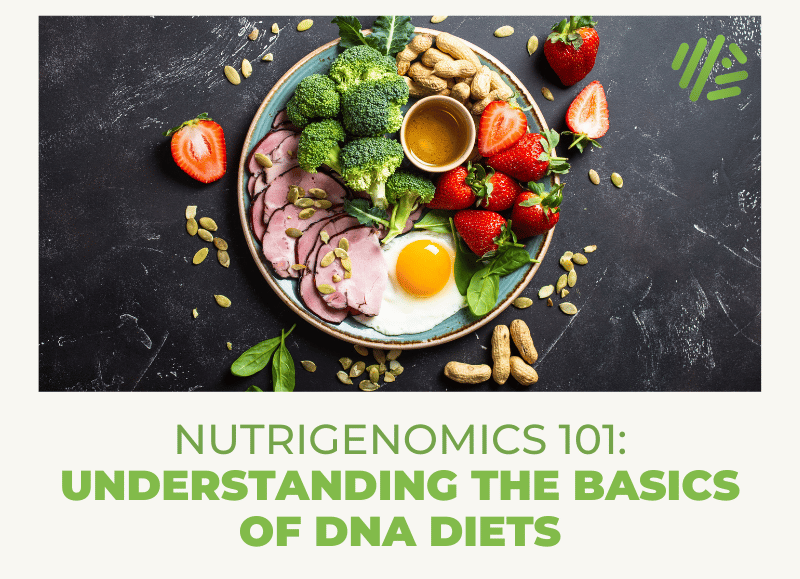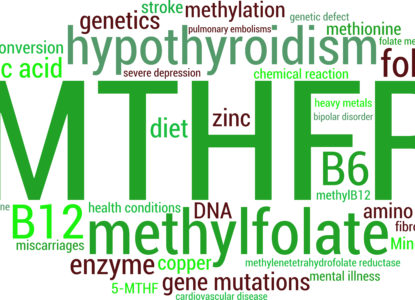Nutrigenomics 101: Understanding the Basics of DNA Diets
Genes Mentioned

Contents
Nutrigenomics, nutrigenetics, nutriepigenetics, nutritional genomics, DNA diets – whatever you call it, it’s the future of human nutrition and health.
In fact, my job at Gene Food over the last few years has been writing the Gene Food nutrigenomics algorithm. My team and I survey all of the latest scientific research and include over 129 genetic markers in the genetic risk scoring we do to determine, for example, whether a customer is likely to have an inflammatory reaction to saturated fat that could increase heart health markers like LDL-C to unhealthy levels. While nutrigenomics is still relatively new, and can’t answer all questions about health and nutrition, we believe in this process and see it helping people on a daily basis.
For more on the science behind nutritional genomics, see our science page.
What is nutrigenomics, though?
At its core, nutrigenomics is an area of science that examines the relationship between the food we eat and our genes. If you’re new to nutrigenomics, consider this a crash course to get you started. I’ll offer a quick overview of this field of study and a few examples of how nutrigenomics works in practice.
See also – Do DNA diets work?
What is nutrigenomics?
Nutrigenomics is a portmanteau of nutritional genomics and describes an area of science that encompasses the human genome, nutrition, and health. Folks who work in this field are interested in figuring out how nutrients affect gene expression (i.e. turning genes on or off).
While nutrigenomics looks specifically at the effect of nutrients on gene expression, the science of nutrigenetics has a wider remit. Nutrigenetics looks at how gene variants respond to nutrients, foods, and nutraceuticals.
In other words, this whole are of research is bidirectional. Your genes affect how your body responds to food and specific nutrients and, in the other direction, the foods you eat and supplements you take can affect how your genes are expressed.
Different variants of the same gene can dramatically alter how well a person is able to digest, absorb, metabolize, and synthesize certain nutrients.
- Nutrigenomics – the study of how your diet affects your genes, including regulating changes in protein production and metabolism
- Nutrigenetics – the study of how your specific gene variants affect your response to dietary nutritional components.
OK, so what about nutriepigenetics? Well, this is a portmanteau of nutritional epigenetics, which is a field of science that operates at the molecular level. Nutriepigeneticists look specifically at the interaction between molecules in foods and molecules that attach to DNA to control gene expression. So, dietary methyl groups, DNA methylation, and resulting gene expression are the purview of nutriepigeneticists.
There are, then, some clear differences between these three areas of research. However, for most of us, the term nutrigenomics works to cover the general area of study.
Nutrigenomics: an example
Does this all sound a little too complicated? Maybe it will be helpful to think of nutrigenomics as the process by which the body uses enzymes to metabolize nutrients. Foe example, beta carotene. Beta carotene converts into Vitamin A, which is the “bioavailable” form of the vitamin our bodies can use.
How does this happen? The BCO1 gene codes for a special enzyme that breaks down and metabolizes beta carotene and converts it into Vitamin A. Some of us have greater enzyme activity to make this conversion and some, with certain “mutations” in the BCO1 genes, have less. That is nutrigenomics in a nut shell. If we know that a given individual can’t effectively convert beta carotene into Vitamin A, we may need to give them a Vitamin A supplement or make sure they get adequate sources of Vitamin A in their diets. This is the process of personalizing nutrition step by step.
Why should you care about nutrigenomics?
Unless you’re a nutrigeneticist, you don’t really need to quibble over the difference between nutrigenomics, nutrigenetics, and nutriepigenetics. The important thing to appreciate is that we don’t all respond the same way to the same dietary patterns, specific foods, and even certain forms of nutrients.
What does this mean on a practical level? Well, for a start, there is no one-size-fits-all when it comes to nutrition and health. Many nutritionists and scientists (myself included) have been saying this ad nauseum for decades.
Nutrigenomics is inclusive
Secondly, it’s worth reconsidering conclusions drawn from nutrition research done over, say, the last century. The majority of this research has been carried out in healthy, white, American men. Can we really extrapolate beyond those included in such studies, given the different genetic make-up of the wider population? In some cases, no. And in a handful of cases, to do so has proven downright dangerous. For example, on a recent podcast episode with world renowned lipid expert Dr. Thomas Dayspring, the triglyceride to HDL ratio (TG/HDL) was discussed. The TG/HDL ratio, when out of balance, is a sign of insulin resistance in White populations, but not in the Black community. African Americans are far less likely to have high circulating levels of triglycerides in the blood, but that doesn’t mean diet and lifestyle changes still aren’t necessary to control blood sugar and metabolic disease.
Understanding nutrigenomics allows us to refine nutrition research to see how specific gene variants interact with nutrients. This leads us to a bright future for personalized nutrition and tailored medical interventions. Let’s look at some examples.
Practical applications of nutrigenomics
The rise of at-home genetic testing has made it easier than ever to map your genome. You can submit your saliva sample to 23andme and, within a couple of weeks, get access to your raw genetic data. With this, you can see if you’re carrying variants of genes that have been associated with metabolic issues or which may require certain nutrients as co-factors to function properly.
For instance:
- Mutations in the FTO gene have been linked to an increased likelihood of being obese, but also with a reduced ability to deal well with dietary fats 1
- Genetic variants in LDLR, PCSK9, and APOB make it more likely a person will have high cholesterol and develop cardiovascular disease. Dietary modifications may be able to help carriers of these genes keep cholesterol levels in the safe zone 2
- The genetic variant APOE4 is more common among people with Alzheimer’s disease than in the general population. 3 APOE4 carriers are more likely to absorb greater amounts the cholesterol they eat, and are also more likely to make more cholesterol when eating a diet high in saturated fats. 4
- African American and Mexican populations tend to carry the “hyper converter” FADS1 gene with more frequency. This means they turn linoleic acid into arachidonic acid at a faster rate and tend to get a bigger inflammatory response when they eat omega-6 fats. Many conversations in the nutrition world point out that arachidonic acid is an essential fatty acid and this is true, however, research has largely ignored the fact that the Black community may respond differently to high levels of omega-6 fats than do Caucasian populations. 5
The practical application of nutrigenomics, then, is that it let’s us consider how an individual might respond to dietary modifications. This is unprecedented in human history. We no longer need to just assume that the average response from a handful of volunteers in a trial will be how everyone else will respond. Instead, we can consider how nutrients and genes interact and create more personalized, tailored, and effective nutrition plans based on a person’s genome.
Nutrigenomics also offers the possibility of tailoring drug regimens, thus improving efficacy and reducing unnecessary risks. For instance, a person may have certain genetic variants that make them a hyper-absorber of cholesterol. This person might respond especially well to medications that inhibit cholesterol absorption, like Zetia.
Conversely, a person with high cholesterol whose genetics make them unlikely to absorb much dietary cholesterol would need a different approach to keep cholesterol in check.
Nutrigenomics in the Black community
We touched on it earlier with our discussion of why the TG/HDL ratio doesn’t apply to the Black community and also discussed potential health issues in the Black community with high omega-6 intake. Heart disease impacts the Black community even more than other populations. Young African American men and women get heart disease and hypertension earlier than their White peers. Sure enough, when you crack open studies that measure arachidonic acids (ARA) levels in African American populations, they have higher levels of ARA than European populations. When ARA levels get too high, they set off a pro-inflammatory state in the body that contributes to chronic illness. By evaluating the differences between ethnic groups, we can come to understand that foods that are harmless for one group may be contributing to disease states in another. To quote authors of one study from the British Journal of Nutrition on ARA metabolism and inflammation in the Black community:
The striking racial and ethnic differences in prevalence and/or severity of common diseases is likely explained by a complex combination of environmental, social, cultural or economic factors, and genetic factors are likely to be very important as well.
This is what makes nutrigenomics particularly exciting, we are learning how to help improve the health of underrepresented communities for whom the “one size fits all” party line may not apply. Nutrigenomics may be an important answer to lowering rates of heart disease in the Black community.
The future of nutrigenomics
Nutrigenomics is, of course, only as good as the data available. Thankfully, we live in exciting times where nutrigeneticists examining the interplay of genes and diet uncover new insights almost daily. In the past, most clinical trial data has skewed heavily toward certain demographics. Unfortunately, the same is currently true of population wide genetics research. In the future, greater diversity will undoubtedly lead to greater insights into nutrigenomics. This could have profound consequences for the health of billions of people worldwide.
So, watch this space for future discoveries and subscribe to the Gene Food podcast for more in-depth discussions of the latest nutrigenomics research.




This looks very impressive and the applications for customization of treatments for maladies is so promising, let alone, living as healthy as possible. I wonder if there are accurate amounts of vitamins and supplements that can be recommended via your testing too?
I know you recommend taking certain minerals and vitamins, and am so glad this is included. Very impressed actually.
Can our genes change? Will taking the correct vitamins and foods change our “genetics” and thus will taking this test, every few years give us different results?
There are a handful of supplements that nutrigenomic tests can help optimize for, however, the primary purpose of nutrigenomics is not supplements recommendations. Be wary of DNA diet providers pushing supplements. To answer your other question, no, our genes do not change. What can change is how our genes express over time. Diet and lifestyle can change how a given gene functions, but not the presence of that gene.
Thanks for clarifying this, and yes, I would be wary of those who recommend products. 🙂